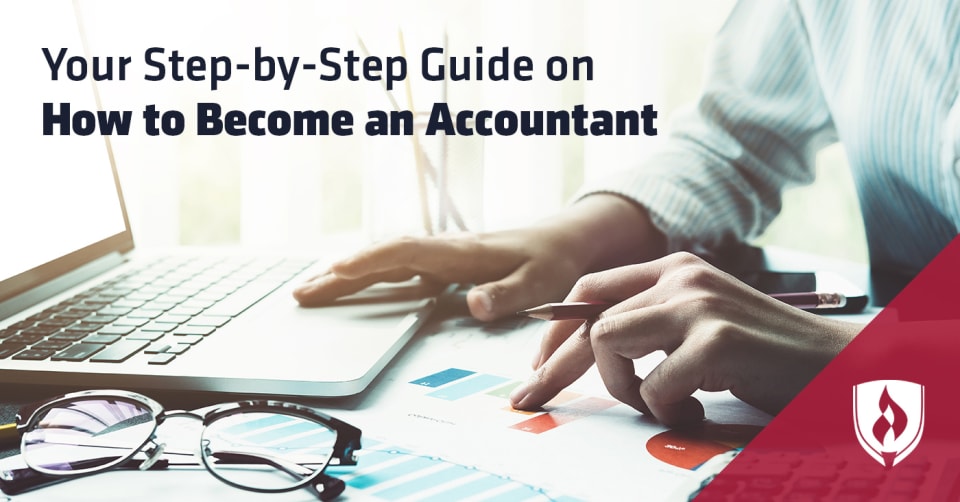Rarely will you find a large, successfully-run business that hasn’t invested in the services of an accountant. Accounting is a central part of what makes the business world tick. Small corporations and booming enterprises alike need accountants to ensure their finances are in good shape.

From managerial accounting and financial reporting, to payroll and bookkeeping, accountants give organizations the ability to pay their employees, stay up to date on recent laws and tax changes, and help guide major business decisions.
If you’ve always been someone who loves numbers—or if you think tracking spending and making budgets is actually pretty interesting—then a career in accounting might be up your alley. With the Bureau of Labor Statistics reporting accountants as having a higher-than-average salary and a solid projection for employment growth, it’s easy to see how this line of work can be appealing.1
But how do you get from where you are at point A to an accounting career at point B? We know you appreciate having all of the details upfront, so we did the research for you. Keep reading for a step-by-step guide to becoming an accountant.
5 Straightforward steps to becoming an accountant
Every accountant’s path will be slightly different. But there are certain steps that are hard to bypass. Learn more about the journey toward becoming an accountant.
1. Find a program that suits you
Consider what type of degree you want—an associate, bachelor’s or graduate degree—and take into account the type of specialty you’re interested in, if any, after you graduate. For example, if you know you are interested in forensic accounting, you can ask program representatives which academic path you should take to best prepare for that career.
These days, you should also consider what type of learning environment you prefer. Are you looking for an online program or would you prefer being on campus? There are positives to both worth weighing. Certain colleges may have self-paced options that allow you to earn your degree your way. Either way, it’s important to find the best option for you.
2. Find the right educational path
Most employers require their accountants to have at least a bachelor’s degree, according to the Bureau of Labor Statistics (BLS).1 Job postings reflect this, as well—our analysis of over 170,000 accounting job postings from the past year showed that 98 percent of postings were seeking candidates with a bachelor’s degree or higher.2
That makes a bachelor's degree in accounting a key component in becoming an accountant. It’s worth noting that there are also accounting-related positions like bookkeeper, payroll specialist or tax preparer that may be available to those with an associate’s degree. These positions could serve as experience-building stepping stones if you choose to take an incremental path toward working as an accountant.
No matter the route you take, you’ll need an education.
3. Earn your degree and gain experience
This is the part where you buckle down and learn! A great accounting program will teach you best practices, industry requirements and business scenarios to prepare you for a successful future in the accounting world.
It’s also a good idea to consider pursuing an internship (or an externship) while in school. While some programs may not require them, it’s never a bad thing to gather some real-world experience. As we mentioned before, you may also be able to find entry-level positions in accounts payable/receivable or tax preparation as you work your way through school. Any of these opportunities can help your resume stand out to future employers!
4. Determine what type of accountant you’d like to be
There are a few different types of accounting credentials you can pursue once you’ve earned your degree. Choosing a direction really depends on what you want out of your career and how much education and experience you’re willing to obtain before you’re certified.
Most aspiring accountants find themselves debating between becoming a public accountant or a private accountant. There are pros and cons to both, but it really comes down to your personal preferences and career goals.
Public accountants work with a variety of clients to prepare financial documents, such as taxes. Private accountants work for a specific organization, preparing and analyzing reports for internal executives. The difference may seem simple, but there is a pretty dramatic difference in work environments. So it’s important to decide which option you prefer.
Check out our article, “Public vs. Private Accounting: Your Guide to Choosing a Side” to learn more about which option fits you best.
5. Land a job and prepare for certification exams
After graduation, you’ll want to get started on your job search. While you might ultimately have your mind set on earning an additional certificate or credential, that doesn’t mean an accounting job is out of reach until you have it. Search local job boards for staff accounting positions, polish up your resume, ace the interview and get started building experience.
From here, you should have a good understanding of what (if any) accounting credential you’ll want to pursue, so you’ll want to study up on the specific need-to-know subject areas of the exam or exams ahead of you.
The CPA certification, for example, consists of four exams. Studying for these tests usually requires months of hitting the books, memorizing terms and learning the ropes of the accounting world. There’s a multitude of resources, tutorials and sample tests that can help you prepare—but you’ll need to make the time.
Is being an accountant part of your future?
Now that you know the ins and outs of how to become an accountant, you can make a calculated decision whether this career path is right for you! The BLS projects demand for accounting professionals to rise, and if you’re passionate about the field, you’re a necessary commodity for a host of organizations. Check out our article, "9 Hot Accounting and Finance Certifications Employers Are Seeking in 2019".
But since you aren’t one to dive in without double-checking the numbers, you’re probably wondering if an accounting degree will pay off. Our article, “Is an Accounting Degree Worth It or Worthless?” helps make the case.
1 Bureau of Labor Statistics, U.S. Department of Labor, Occupational Outlook Handbook, [accessed April 25, 2019] www.bls.gov/ooh/. Salary data represents national, averaged earnings for the occupations listed and includes workers at all levels of education and experience. This data does not represent starting salaries and employment conditions in your area may vary.
2Burning-Glass.com (analysis of 170,165 accountant job postings, Mar. 01, 2018 and Feb. 28, 2019).
EDITOR’S NOTE: This article was originally published in 2016. It has since been updated to include information relevant to 2019.




